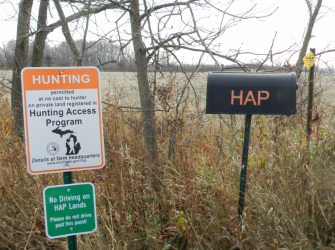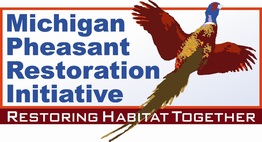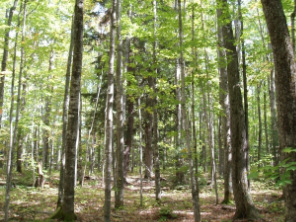Hunting Access Program (HAP)
Landowners: Payments for you, land for hunters!

The Hunting Access Program (HAP) offers landowners payment and liability protection in exchange for providing hunters limited access to their property.
Why Enroll your Properties in HAP?
-Annual compensation payments of up to $25 an acre!
-Opportunity to reduce nuisance wildlife and contribute to wildlife management.
-Free landowner liability coverage.
-You decide to allow all species hunting, youth and apprentice hunting only, small game only, deer only, turkey only, sharp-tailed grouse only, elk only, or a combination of these.
-Limit the number of hunters at one time.
-Preserve Michigan's hunting tradition and hunter recruitment!
Landowner Liability: Are you Covered?
YES!
P.A. 451 of 1994 provides liability protection for landowners enrolled in HAP.
"No cause of action shall arise for injuries to persons hunting on lands leased under HAP unless the injuries were caused by gross negligence or willful and wanton misconduct of owner, tenant, or lessee."
How do I enroll?
-Landowners in eligible HAP counties owning 40 or more acres are eligible to apply (See Map)
-HAP contracts are for two-three years and can include forest, wetland, grassland, and cropland cover.
-For questions and to enroll your property, e-mail dnr-hap@michigan.gov or call (517) 284-4741 or contact your local Conservation District office!
Find a current listing of enrolled HAP lands at: http://www.michigan.gov/dnr/0,1607,7-153-10363_10913_58762---,00.html
Why Enroll your Properties in HAP?
-Annual compensation payments of up to $25 an acre!
-Opportunity to reduce nuisance wildlife and contribute to wildlife management.
-Free landowner liability coverage.
-You decide to allow all species hunting, youth and apprentice hunting only, small game only, deer only, turkey only, sharp-tailed grouse only, elk only, or a combination of these.
-Limit the number of hunters at one time.
-Preserve Michigan's hunting tradition and hunter recruitment!
Landowner Liability: Are you Covered?
YES!
P.A. 451 of 1994 provides liability protection for landowners enrolled in HAP.
"No cause of action shall arise for injuries to persons hunting on lands leased under HAP unless the injuries were caused by gross negligence or willful and wanton misconduct of owner, tenant, or lessee."
How do I enroll?
-Landowners in eligible HAP counties owning 40 or more acres are eligible to apply (See Map)
-HAP contracts are for two-three years and can include forest, wetland, grassland, and cropland cover.
-For questions and to enroll your property, e-mail dnr-hap@michigan.gov or call (517) 284-4741 or contact your local Conservation District office!
Find a current listing of enrolled HAP lands at: http://www.michigan.gov/dnr/0,1607,7-153-10363_10913_58762---,00.html
Michigan Pheasant Restoration Initiative

The Michigan Pheasant Restoration Initiative (MPRI) is a grass-roots conservation initiative to restore pheasant populations and habitat in Michigan's traditional pheasant range. A variety of MPRI partners provide technical and financial assistance to help landowners enhance their lands for pheasants and other wildlife. Below is a summary of programs MPRI partners offer to assist private landowners. For more information about MPRI, visit: www.michigan.gov/pheasant
Pheasants rely on high-quality grassland and agricultural areas for adequate cover and food resources throughout their life. Changes in agriculture practices, urbanization, and reforestation have contributed to their declining numbers. Your help is needed to improve pheasant habitat and populations in your local area!
Pilot Areas
Partners of the initiative identified three pilot areas in which to focus initial restoration efforts. These were chosen based on evaluation of pheasant numbers present, available habitat, and habitat restoration potential. These Michigan Counties include: Huron, Sanilac, & Tuscola; Clinton, Gratiot, & Saginaw; Hillsdale, Lenawee, & Monroe.
Benefits of the Initiative Go Beyond Pheasants
The initiative will:
- Increase habitat for grassland wildlife species
- Boost soil and water quality
- Enhance, beautify, and protect open spaces
- support beneficial pollinator species
- Create lasting partnerships
- Leave a legacy for future generations
Habitat Restoration
Restoring pheasant habitat on both private and public lands is vital to increasing pheasant numbers. Every acre of high-quality habitat is important, whether it be a few or many acres. However, the larger the block of habitat, the more likely it is to support a greater number and density of pheasants. Ideally, cooperatives involving both public and private lands that provide at least 1,200-2,000 acres of high-quality pheasant habitat within a 10,000-acre area will have the greatest success at restoring pheasant populations and hunting opportunities. Such cooperatives fulfilling these basic habitat requirements may also be eligible to receive wild-trapped pheasants from a prime pheasant production state in the Midwest if the local pheasant population does not positively respond as expected.
Join the Initiative
The best way to increase pheasant populations is through restoration of pheasant habitat on both public and private lands. Every acre counts. Those who partner with others to work on larger blocks of land that link multiple private ownership to public land through habitat cooperatives will have an even greater positive impact on pheasant habitat and numbers. Now is the time to act to restore the pheasant in Michigan's traditional pheasant range. To do this, we need your help!
Please Contact one of the people listed below:
Cooperative Coordinator
Anna Mitterling
Michigan United Conservation Clubs
(517) 346-6454
amitterling@mucc.org
Pilot Area Coordinators
Hillsdale, Lenawee, and Monroe Counties
Nathan McNett
(517) 263-7400 Ext. 119
Nathan.mcnett@mi.nacdnet.net
Huron, Sanilac, and Tuscola Counties
(989) 673-8174
Clinton, Gratiot, and Saginaw Counties
(989) 875-3900 Ext. 101
Pheasants rely on high-quality grassland and agricultural areas for adequate cover and food resources throughout their life. Changes in agriculture practices, urbanization, and reforestation have contributed to their declining numbers. Your help is needed to improve pheasant habitat and populations in your local area!
Pilot Areas
Partners of the initiative identified three pilot areas in which to focus initial restoration efforts. These were chosen based on evaluation of pheasant numbers present, available habitat, and habitat restoration potential. These Michigan Counties include: Huron, Sanilac, & Tuscola; Clinton, Gratiot, & Saginaw; Hillsdale, Lenawee, & Monroe.
Benefits of the Initiative Go Beyond Pheasants
The initiative will:
- Increase habitat for grassland wildlife species
- Boost soil and water quality
- Enhance, beautify, and protect open spaces
- support beneficial pollinator species
- Create lasting partnerships
- Leave a legacy for future generations
Habitat Restoration
Restoring pheasant habitat on both private and public lands is vital to increasing pheasant numbers. Every acre of high-quality habitat is important, whether it be a few or many acres. However, the larger the block of habitat, the more likely it is to support a greater number and density of pheasants. Ideally, cooperatives involving both public and private lands that provide at least 1,200-2,000 acres of high-quality pheasant habitat within a 10,000-acre area will have the greatest success at restoring pheasant populations and hunting opportunities. Such cooperatives fulfilling these basic habitat requirements may also be eligible to receive wild-trapped pheasants from a prime pheasant production state in the Midwest if the local pheasant population does not positively respond as expected.
Join the Initiative
The best way to increase pheasant populations is through restoration of pheasant habitat on both public and private lands. Every acre counts. Those who partner with others to work on larger blocks of land that link multiple private ownership to public land through habitat cooperatives will have an even greater positive impact on pheasant habitat and numbers. Now is the time to act to restore the pheasant in Michigan's traditional pheasant range. To do this, we need your help!
Please Contact one of the people listed below:
Cooperative Coordinator
Anna Mitterling
Michigan United Conservation Clubs
(517) 346-6454
amitterling@mucc.org
Pilot Area Coordinators
Hillsdale, Lenawee, and Monroe Counties
Nathan McNett
(517) 263-7400 Ext. 119
Nathan.mcnett@mi.nacdnet.net
Huron, Sanilac, and Tuscola Counties
(989) 673-8174
Clinton, Gratiot, and Saginaw Counties
(989) 875-3900 Ext. 101
Michigan's Qualified Forest Program

A tax exemption program for forestland owners.
The Qualified Forest Program (QFP) provides a property tax exemption for private landowners who actively manage their forests and woodlands for commercial harvest. The goal of the program is to fuel regional economies through timber harvest and individual tax savings.
How does land qualify for the program?
- Parcels must be 20 acres or larger to qualify
- Parcels from 20-39 acres must be at least 80 percent stocked with forest capable of producing wood products
- Parcels from 40-640 acres must be at least 50 percent stocked with forest capable of producing wood products
- A forest management plan is required for the parcels being enrolled
Terms and Conditions
- Buildings and structures are allowed, but are not eligible for exemption
-The property will be subject to a recapture tax if the landowner does not follow the management plan or if the land is converted by a change in use
- Enrolled landowners must pay an annual fee equivalent to two mills multiplied by the taxable value of the property
- All fees and recapture taxes are deposited in the Private Forestland Enhancement Fund
Private Forestland Enhancement Fund
The Private Forestland Enhancement Fund is intended to stimulate improved forest management on private lands. The fund supports opportunities for future high-quality timber supplies, increased employment opportunities, a diversified economy, as well as the conservation, maintenance, and enhancement of a stable private forest resource.
Benefits
The program provides two potential tax benefits for enrolled landowners: 1.) A maximum 18 mill reduction of school operating taxes on non-homestead property with the Qualified Forest School Tax Affidavit. 2.) The Qualified Forest Taxable Value Affidavit prevents the "uncapping" of a property's taxable value when a parcel currently enrolled in QFP changes ownership.
Public Access
Allowing public access is not a requirement on land enrolled in the Qualified Forest Program.
How to Apply
- Contact the Michigan Department of Agriculture and Rural Development for information about the program or visit our website at www.michigan.gov/qfp. You may also check with your local Conservation District to determine if they can assist you.
- Visit www.michigan.gov/qfp to download the application instructions and forms
- Hire a Forester to develop your forest management plan. A list of foresters eligible to write plans for the QFP is available on the website.
- Follow the instructions and submit the following for a complete application:
> Forest Management Plan
>QFP Application
> QFP Practice Schedule
> Copy of a recent property tax bill for each parcel in the application
> Copy of the most recent deed and/or land contract for each parcel in the application
> $50 Application Fee
-Application materials should be submitted electronically to mdard-qfp@michigan.gov
- Complete applications must be received by September 1 prior to the tax year the exemption is requested.
The Qualified Forest Program (QFP) provides a property tax exemption for private landowners who actively manage their forests and woodlands for commercial harvest. The goal of the program is to fuel regional economies through timber harvest and individual tax savings.
How does land qualify for the program?
- Parcels must be 20 acres or larger to qualify
- Parcels from 20-39 acres must be at least 80 percent stocked with forest capable of producing wood products
- Parcels from 40-640 acres must be at least 50 percent stocked with forest capable of producing wood products
- A forest management plan is required for the parcels being enrolled
Terms and Conditions
- Buildings and structures are allowed, but are not eligible for exemption
-The property will be subject to a recapture tax if the landowner does not follow the management plan or if the land is converted by a change in use
- Enrolled landowners must pay an annual fee equivalent to two mills multiplied by the taxable value of the property
- All fees and recapture taxes are deposited in the Private Forestland Enhancement Fund
Private Forestland Enhancement Fund
The Private Forestland Enhancement Fund is intended to stimulate improved forest management on private lands. The fund supports opportunities for future high-quality timber supplies, increased employment opportunities, a diversified economy, as well as the conservation, maintenance, and enhancement of a stable private forest resource.
Benefits
The program provides two potential tax benefits for enrolled landowners: 1.) A maximum 18 mill reduction of school operating taxes on non-homestead property with the Qualified Forest School Tax Affidavit. 2.) The Qualified Forest Taxable Value Affidavit prevents the "uncapping" of a property's taxable value when a parcel currently enrolled in QFP changes ownership.
Public Access
Allowing public access is not a requirement on land enrolled in the Qualified Forest Program.
How to Apply
- Contact the Michigan Department of Agriculture and Rural Development for information about the program or visit our website at www.michigan.gov/qfp. You may also check with your local Conservation District to determine if they can assist you.
- Visit www.michigan.gov/qfp to download the application instructions and forms
- Hire a Forester to develop your forest management plan. A list of foresters eligible to write plans for the QFP is available on the website.
- Follow the instructions and submit the following for a complete application:
> Forest Management Plan
>QFP Application
> QFP Practice Schedule
> Copy of a recent property tax bill for each parcel in the application
> Copy of the most recent deed and/or land contract for each parcel in the application
> $50 Application Fee
-Application materials should be submitted electronically to mdard-qfp@michigan.gov
- Complete applications must be received by September 1 prior to the tax year the exemption is requested.

Forestry Assistance Program
Conservation Districts helping private landowners manage their land
The Michigan Department of Agriculture and Rural Development and the Department of Natural Resources partner to fund Conservation Districts across the state to support quality forestry assistance delivered at the local level.
Forestry Assistance Program (FAP) foresters are committed to providing good information and one-on-one technical assistance to private landowners and communities about forest health and sustainability.
The purpose of the program is to help private landowners in Michigan better plan, understand, manage, protect and utilize their forest resources.
How can Forestry Assistance Program (FAP) help you?
Whether your use your forested property for hunting, fishing, bird watching, timber production, outdoor recreation, or to assure future generations can enjoy the land- we can provide your with the tools to make sure your part of Michigan's forests maintain a healthy and sustainable balance.
A Conservation District Forester can visit your property and provide as assessment at no cost to answer your questions and help you get to the next step in meeting y our land management objectives.
What does an "Assessment" Include?
When you make an appointment for a free assessment, your FAP Forester will provide customized information about your property like aerial photographs and soil survey information. During the assessment they will ask questions about your goals, objectives, and previous management history while completing a quick inventory of your land. They will also provide you with information about state and federal assistance programs for private landowners, and help connect you to local professionals who can provide you with quality service.
Other Services
- Timber harvest planning
- Managing forests for wildlife habitat
- Forest disease and pest management
- State and federal forestry assistance programs
- State tax incentive programs
- Connection to consulting foresters and other natural resource professionals
To find your FAP Forester:
Visit: www.michigan.gov/MIFAP and click on your County, or Call (517) 284-5607.
Conservation Districts helping private landowners manage their land
The Michigan Department of Agriculture and Rural Development and the Department of Natural Resources partner to fund Conservation Districts across the state to support quality forestry assistance delivered at the local level.
Forestry Assistance Program (FAP) foresters are committed to providing good information and one-on-one technical assistance to private landowners and communities about forest health and sustainability.
The purpose of the program is to help private landowners in Michigan better plan, understand, manage, protect and utilize their forest resources.
How can Forestry Assistance Program (FAP) help you?
Whether your use your forested property for hunting, fishing, bird watching, timber production, outdoor recreation, or to assure future generations can enjoy the land- we can provide your with the tools to make sure your part of Michigan's forests maintain a healthy and sustainable balance.
A Conservation District Forester can visit your property and provide as assessment at no cost to answer your questions and help you get to the next step in meeting y our land management objectives.
What does an "Assessment" Include?
When you make an appointment for a free assessment, your FAP Forester will provide customized information about your property like aerial photographs and soil survey information. During the assessment they will ask questions about your goals, objectives, and previous management history while completing a quick inventory of your land. They will also provide you with information about state and federal assistance programs for private landowners, and help connect you to local professionals who can provide you with quality service.
Other Services
- Timber harvest planning
- Managing forests for wildlife habitat
- Forest disease and pest management
- State and federal forestry assistance programs
- State tax incentive programs
- Connection to consulting foresters and other natural resource professionals
To find your FAP Forester:
Visit: www.michigan.gov/MIFAP and click on your County, or Call (517) 284-5607.
The Healthy Forest Reserve Program (HFRP) was designed as an off shoot of the Wetlands Reserve Program to allocate special funding and projects in regards to the Copperbelly Water Snake and its habitat, a Federally Listed Threatened Species. The HFRP is designed to conserve both the wetland and its surrounding watershed, to enable a healthier environment for the species. The Copperbelly Water Snake is unique to two locations in the Midwest, including the threatended population of Southern Michigan, Northeastern Indiana, and Northwestern Ohio. The second population in Southern Indiana, Southern Illinois, and Western Kentucky is not yet threatened, but is still protected. Lowland swamps and slow waters make up most of the Copperbelly Water Snake's habitat, as well as upland woods that are used for foraging, winter hibernation, and nesting.

